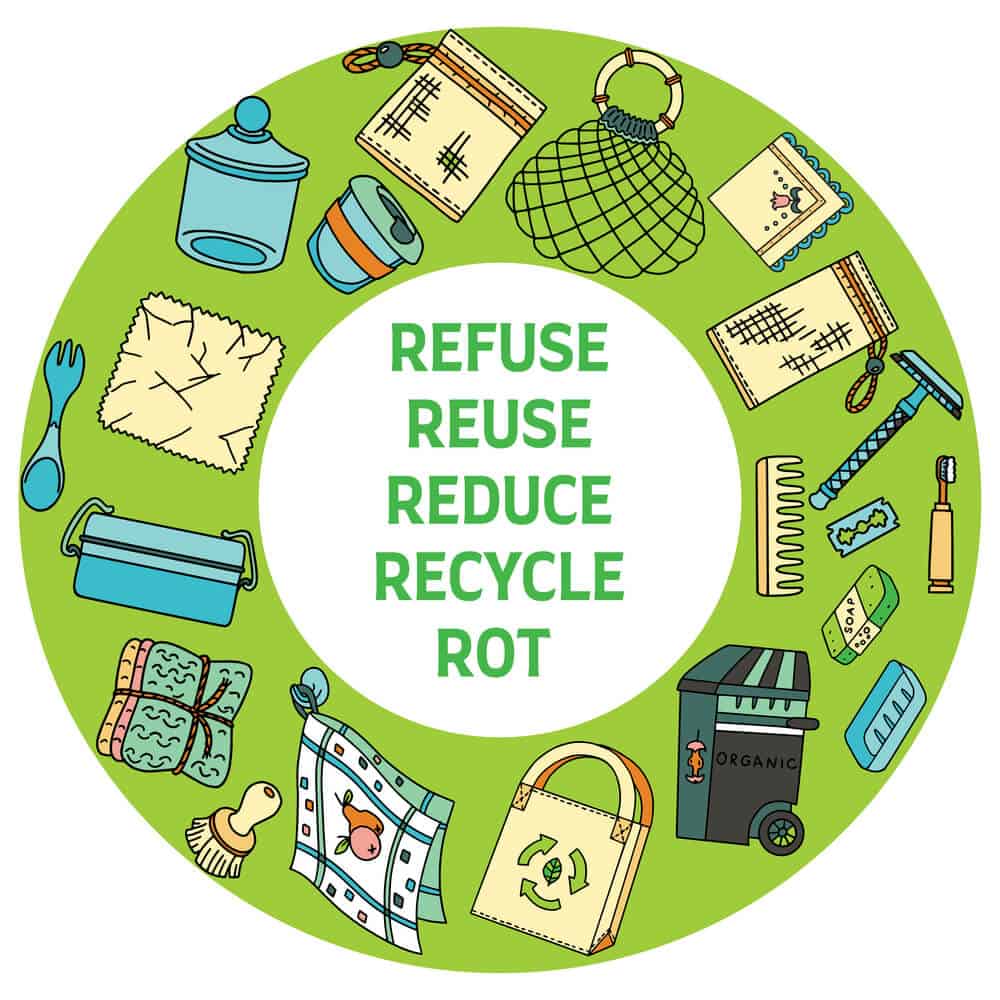Zero Waste is a strategy that began in 2002, with foundations as far back as 1996, by doctors, scientists, and policy experts.
They created this in an attempt to help deal with waste management problems and reduce carbon footprints.
Adverse impacts to the environment created by trash is astounding, contributing to dangerous CO2 emissions and overflowing landfills.
Proponents of Zero Waste claim it will mitigate this problem. But, we don’t know if it helps because there’s little data to support it.
What Is Zero Waste?
According to the Zero Waste International Alliance (ZWIA), the concept involves conserving resources by recommending responsible practices for governments, consumers, and citizens to abide by.
These include standards for production, consumption, reusing, and recovering of materials, packaging, and products.
The idea is not to burn or bury Waste while preventing toxic discharges from affecting water, land, air, human health or the environment.
By following these recommendations, they assert a waste reduction of 90%.
Zero Waste means neither doing all recycling nor does it mean turning all Waste into energy.
This is because Waste turned into energy destroys precious resources and many recycling efforts use more resources than it conserves.
Is Zero Waste Good For The Environment?
The concept behind Zero Waste sounds great, but the devil is in the details. ZWIA claims that implementing such a policy will guarantee the elimination of toxic discharges while conserving and recovering resources.
But, there is no evidence for this, and there is no way to measure how Zero Waste is good for the environment.
Regardless of the lack of evidence, Zero Waste became part of the UN’s Sustainable Development Goals (SDGs) under the banner of helping reduce CO2.
These programs come under the influence of people like Bill Gates and Klaus Schwab of the World Economic Forum.
Measuring CO2 Emissions
The metric by which the UN determines a country’s carbon footprint is via their SDG Index ranking.
But, according to the Post-Landfill Action Network (PLAN), the equation used for Zero Waste is subjective, incoherent and falls short.
This is what the UN wants to base a Carbon Tax on for dictating Zero Waste policies. Violations, from governments or individuals, will include robust penalties through their Strong Cities Network.
What makes this even more unrealistic is the play on the word, “carbon.” Everything on earth contains carbon, including humans, animals, trees, furniture, cars, appliances, flowers and etc.
Sustainability
The University of Leeds showed how top-ranking countries that seemingly fall within SDG Index limits are actually unsustainable.
To illustrate, Finland emits 13 metric tons of CO2 per person, and China’s is around seven per person. Yet, China is one of the worst polluters while Finland sits among the top three as pollution-free.
Although you could argue China is a larger country, the US has fewer emissions than China.
Potential Outcomes
Every country is to apply Zero Waste methods to reduce CO2 under the models of Finland, Germany and Sweden.
If the whole world were to follow suit, the planet and all life on it would cease to exist.
So, Zero Waste in relationship to the SDG Index creates the illusion that prosperous countries are more sustainable when they aren’t.
Plus, this idea of carbon dioxide being dangerous is somewhat misleading.
Trees rely on carbon dioxide in the same way humans rely on oxygen while humans also exhale carbon dioxide.

Is Zero Waste a Good Practice?
Zero Waste requires a massive, unprecedented transformation from all public and private sectors.
Although we had a taste with SARS-CoV-2, this will ultimately fail since there is no actual blueprint and a lack of depth in planning.
There’s no public support or government follow-through.
Initiatives Don’t Show Promise
For those communities with Zero Waste implementation, a dissertation from Lincoln University in 2012 discovered that none were successful.
This is due in part to the fact that Zero Waste has no meter to see how it reduces environmental impacts. PLAN’s research maintains these findings.
Also, the practices and methods companies must undertake to manufacture Zero-Waste friendly products are exorbitant, which destroys profits.
The burden of expense lands on the consumer and employee wages suffer.
There Are Some Benefits
In theory, reusing, composting, and recycling can benefit, even without a defined metric.
It’s equally unrealistic to allow trash, Waste and toxic discharges to go unchecked. ZWIA has some interesting approaches that include but are not limited to:
- natural resource use and conservation
- incentivizing businesses to make more durable products with less packaging materials
- prioritizing the amount of garbage from individual households
- innovative methods for repurposing and reusing
- encouraging the sale of used cars, computers and other appliances
- teaching people to be more conscientious with throwing away trash
SARS-CoV-2 ; Zero Waste
Global leaders observed how the lockdowns made in reaction to SARS-CoV-2 had a positive effect on Climate Change.
They say it lowered CO2 by 5% because of the reduction in Waste.
5% is a number often considered statistically insignificant and achieved by massive deaths, job losses, and an overall lowered quality of life.
But, some countries, like Ireland, think the lockdowns were such a Zero-Waste success that they’re considering “Climate Lockdowns. “Forcing people into their homes is demonstrably disastrous, with results now showing increased alcoholism, drug use, depression, mental illness, domestic violence, and suicide.
What Is Blocking the Success of Zero Waste?
Individual participation may do very little in helping the environment, but this is not to say individuals shouldn’t make an effort.
However, it’s essential to consider that the average citizen isn’t the largest contributor.
In fact, it isn’t even entire counties.
Military Waste
According to a study released in June 2019 by Transactions of the Institute of British Geographers, the Military-Industrial Complex emits more Waste, pollution, garbage and toxic dumps into the environment than any other industrialized country.
The Military-Industrial Complex doesn’t have a population or borders, but it would rank at number 47 among the largest countries emitting CO2.
There are no regulations, laws or oversight against their practices.
Also, the use of nuclear and biochemical weapons by Israel, the US, Saudi Arabia, and other European countries deposits toxic discharges in places like the Gaza Strip, Iraq, Syria, Yemen, and others.
Zero Waste recommendations do not include the environmental impact of these weapons.
Elite Polluters
What’s more, the people espousing mandated participation are the same people emitting their own CO2.
For example, Bill Gates appears to be a leader in the Climate Change fight.
But he contributes to some of the largest CO2 emissions ever recorded by one individual, as revealed in a 2019 study.
He flies private jets and has several large energy-consuming homes, among other questionable practices.
Conclusion
Although it may seem sensible, there is no way to prove or demonstrate that Zero Waste is good for the environment.
Certainly, we must try to keep the planet pristine.
ZWIA’s recommendations for Zero Waste are logical in concept, but we don’t know if it helps.
For any implementations that have come about, Zero Waste policies don’t result in much success.
With the UN hoping to implement legislation against violators of Zero Waste, we need to step back and consider all the implications.



